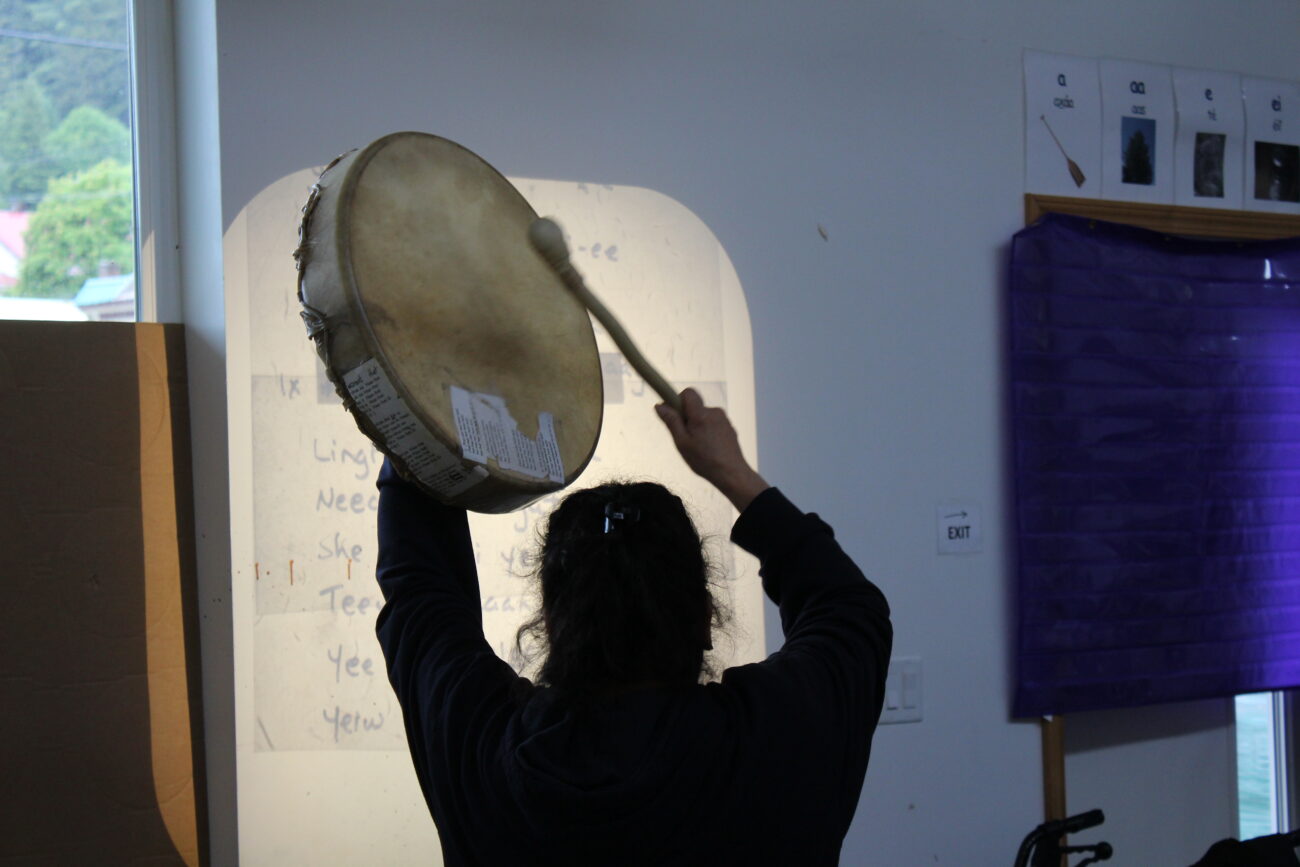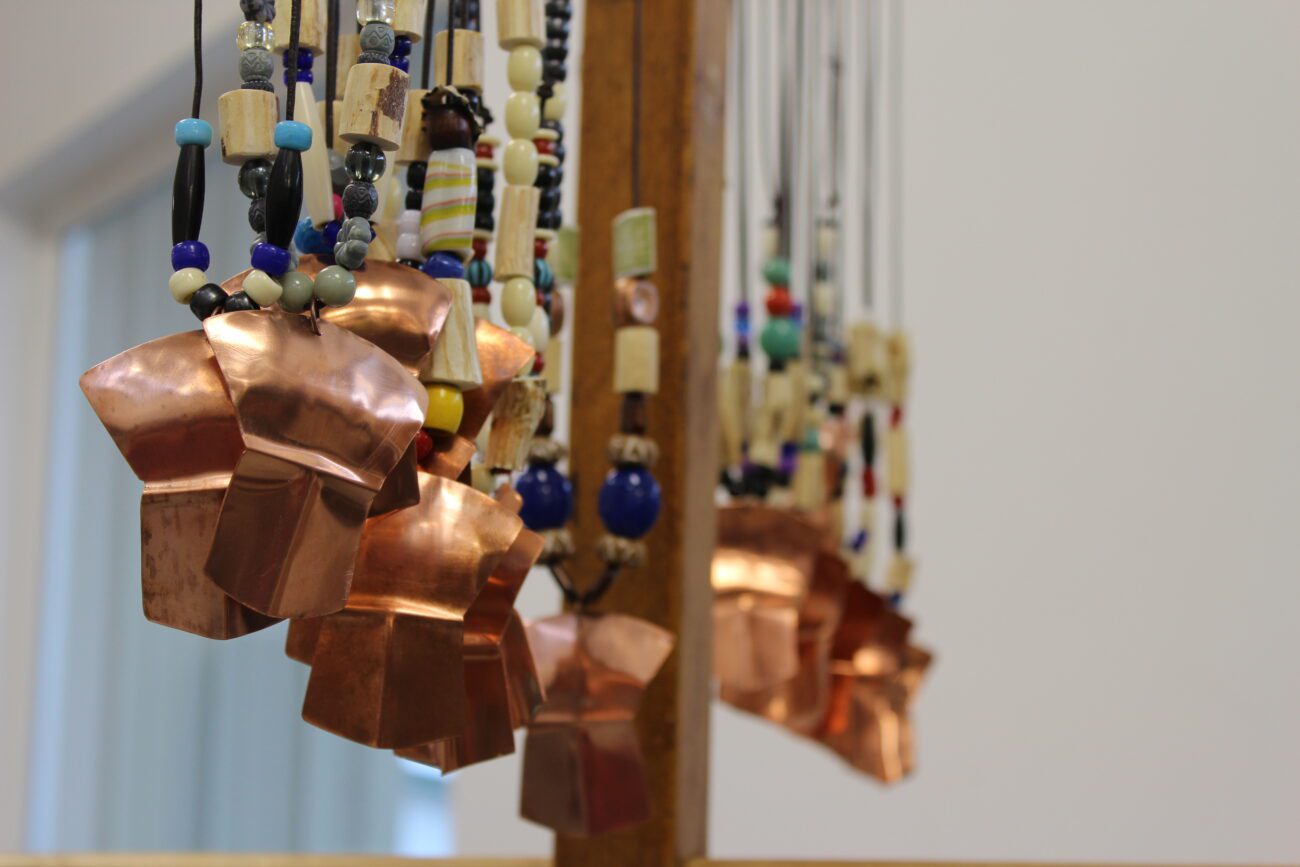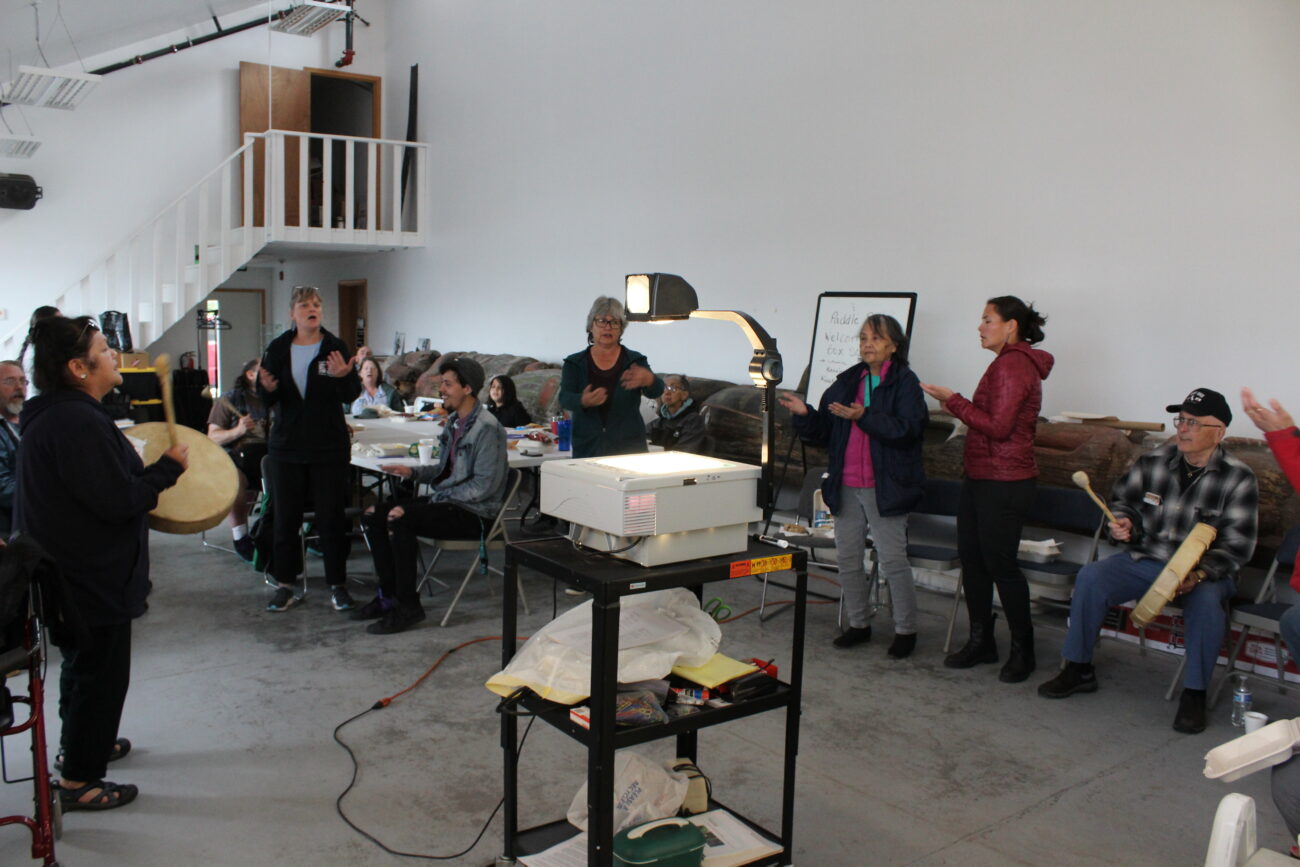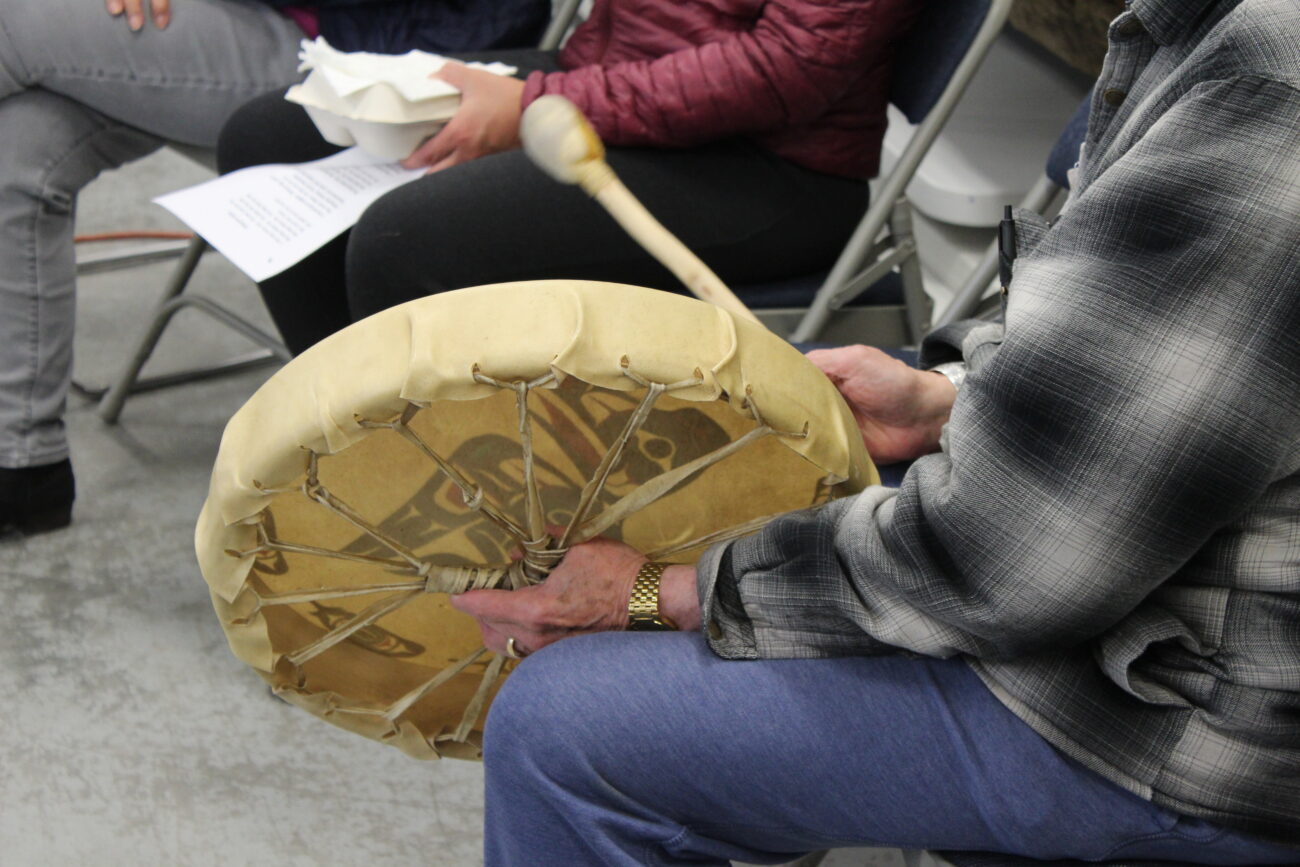
(Sage Smiley / KSTK)
Wrangell is preparing to welcome the Hōkūle‘a, a 62-foot-long double-hulled voyaging canoe sailing first around Southeast Alaska and then throughout the Pacific Ocean. The trip is part of an ongoing effort by the Polynesian Voyaging Society to bring awareness to oceans, science and Indigenous wisdom. KSTK attended a singing and drumming practice on June 15 at Wrangell’s tribal cultural center.
Lingít teacher Xwaanlein Virginia Oliver has wheeled an old-school transparency projector into the Wrangell Cooperative Association’s cultural center downtown.
“Hello everyone,” she says, standing by the projector. “I’m glad you guys are here! Grab a sandwich, get what you can get, there’s water…”

(Sage Smiley / KSTK)
Community members and Lingít language students have been meeting at lunchtime nearly every day, making gifts like tináa, copper shields, and practicing traditional songs and dances. They’re preparing to greet the Polynesian Voyaging Society Hōkūle‘a canoe, on a years-long journey called Moananuiākea – a journey for the earth.
The Tribe and community have also been meeting on Sundays to put together a welcome ceremony, and leaders from Wrangell clans have been meeting on Wednesdays to plan a cultural exchange with the Polynesian voyagers.
Oliver introduces the class by welcoming elder Kudáx̲ ga.háa Ben Jackson, and pointing out the Wrangell clan leaders present.
“The clans in Wrangell are the Naanyaa.aayí, wéidu? Kaakl’aat,” she says, looking around the room and greeting people. “ Kayaashkeiditaan, wéidu? Xúns(i), ah, Taalkweidí, Mr. Sít’ tu xóodzi…”
Today, the projector is out so Oliver can show lyrics to songs the community is learning or refreshing.
Some don’t even need a transparency slide, like the Wrangell welcome song or the Wrangell entrance song.
Others need more practice, and may even be brand new to some who are singing and drumming. Oliver demonstrates the lyrics and beat, and attendees join in, reading along from the transparency slide or printed lyrics.
“Don’t be worried,” Oliver says after the group reads through the song, encouraging. “We’re gonna have time to learn it.”
Songs are part of at.óow, sacred clan property. So some songs are reserved to be sung by smaller groups of people. Some songs have been gifts. And they all have stories. Oliver says one song, X’awditaani Xhixhch, is about the elders hearing a frog hat speak to them as they went to repatriate it from a museum down south.
“They went in to get the frog hat and it spoke to the elders,” Oliver says. “They heard it! ‘How!’ It said something to them. And the song is about that. ‘Waasa ya-axha-khaa-a?’ What did I hear? What did I hear you say? ‘Gunalcheesh yee eesh has xhixhch’i-yee.’ The fathers, our fathers’ frogs. ‘Kaach.adi ya-atx’i, Kaach.adi ya-atx’i,’ children – That’s you guys. You Wolves, you’re the children of the Ravens.”
Another song the group is preparing, K̲aax̲’achgook, is a song of mourning and of celebration.

(Sage Smiley / KSTK)
“It was about hunters that were blown out from Sheet’ká Kwáan, Kiks.ádi men were blown out,” Oliver says. “They went and they were blown way off. And they figured they went to Polynesia, because they were describing these trees [like bamboo]. And he kept dreaming, he watched the night sky and he was dreaming and coming home.”
That pain of not being able to come home is the mourning part of the song. But K̲aax̲’achgook does make it home.
“He had two wives, old wife and young wife,” Oliver says. “Young wife [re]married, but old wife went to the water to wait for him. She never gave up hope of seeing him and he never gave up hope of coming. And they say that they did come back – I think with the help of the Polynesians, they came home. And old wife was down on the water on a rock and she could see him the way people recognize someone walking, she recognized the way he was paddling: K̲aax̲’achgook has returned. K̲aax̲’achgook has returned.”
Other songs speak of the strength and long history of the Stikine Lingít people, and celebrate familial connections.
Elder Kudáx̲ ga.háa Ben Jackson is a fluent Lingít speaker, and shares encouraging phrases with the group preparing songs.
“The more you practice it before the performance,” Jackson says, the less nerves everyone will feel. “[…] you’re all going to say this, you just gather around and: ‘Tlél adaat shx’ayda xeel’í,’ we’re not gonna worry about it. ‘A toonáx ax̲ too.aat,’ we’re gonna walk through it.”
In Lingít, Oliver explains that Polynesian people are called “Náak̲w tl’eig̲í k̲wáan, octopus tentacle people.”
The Hōkūle‘a crew plans to leave Petersburg early in the morning on June 27 and paddle through the Wrangell Narrows to the tip of Wrangell Island, from Petroglyph Beach, which is scattered with rock carvings thousands of years old. Then, they’ll travel south along the coast and into the downtown harbor and to Chief Shakes Island, where they’ll ask for permission to land at the cedar clan house.
A group from Wrangell hopes to meet the Hōkūle‘a in their own canoe.
“We’re getting the canoe ready right now, the big one,” says Sít’ tu xóodzi Tom Gillen, clan leader for the Taalk̲weidí, a clan of the Raven moiety. “And we got it pressure washed yesterday, and we’re going to try to get it turned over to see what it looks like on the inside. And […] practice paddling because you don’t want to get somebody in there that panics about time to get up in the dark and roll it over and over be swimming in the ocean.”
Gillen keeps time in the songs on a drum he’s painted himself, with a teal, black and red formline Raven in the center, “And I’ve got nine feathers [painted] around it. And each feather represents one of the original tribes of Wrangell. I think eventually there was 10. But this the nine original.”
He says he’s feeling good about most of the beats he’s keeping. The end of K̲aax̲’achgook is giving him some trouble.
“I got the beat to it, but then you get the end of it, and then it’s got that hesitation,” he says with a laugh. “Then I missed both of em.”

(Sage Smiley / KSTK)
Middle-schooler Stella Buness and her sister Piper are learning songs, and also thinking about their regalia.
“I had the headband, and then it just fits Piper better,” Stella says. “And then we had my dad’s old regalia he has from when he used to do this, so Piper got it. So we’re seeing if my auntie has any. I still have to ask her.”
Lingít teacher Oliver says she’s honored to be chosen to help with the arrival and departure of the Hōkūle‘a.
“I think it’s really interesting that they’re coming and bringing awareness to the climate and also to the stars,” Oliver says.
She says a part of her wishes to meet the voyagers in the Wrangell canoe.
“I’m not really good on a canoe,” she says, “So I don’t don’t do that. I’m a landlubber. I stay right and land and drum and sing.”
She says she’s especially excited to participate in a cultural exchange – there are many parallels between the history and oppression of Native Hawaiians and Lingít people.
“Their culture was stolen, they talk about a stolen culture, and I think that we feel the same way,” Oliver says, “Because it did happen to us, too. We talk about our, you know, our parents not speaking the language to us, even if they were fluent. They didn’t speak, they were just following the law. They were law-abiding Lingíts.”
Both peoples were subject to vicious cultural and linguistic repression at the hands of colonial authorities and church leaders.
“I think it’s really important to share that with them – to share about because their children were put in boarding schools, and here in Wrangell, there is a boarding school, the remnants of it is still here, it’s fresh in people’s minds,” Oliver says. “It’s so similar to talk about the boarding schools, to talk about the loss of the culture, the stolen culture, and to talk about the songs that they’re going to share. Because they’re navigating, they want to look up at the Alaskan skies too, and see if they can teach a little bit about stargazing and navigating.”
It won’t be the first time Polynesian voyagers will visit Ḵaachx̱an.áak’w (Wrangell). Oliver remembers dancing to greet paddlers who came through in the 1990s.
“I was dancing on Shake’s Island and I was dancing by Ajít, Linda Dewitt and our buttons hooked and we had to dance together through the whole thing, because we were hooked,” Oliver says. “We didn’t want to stop dancing, and I’ll never forget that. But it was such beautiful weather there. God, I remember the weather was just beautiful.”
Oliver says she hopes it will be just as beautiful as Wrangell greets the Náak̲w tl’eig̲í k̲wáan, the Polynesian voyagers, once again.
The Hōkūle‘a is expected to exit the Wrangell Narrows and head to Petroglyph beach at around 11 a.m. on Tuesday, June 27. There’s a welcome ceremony scheduled at Shakes Island after the canoe arrives. That evening, there will be a community dinner and cultural exchange at 6 p.m. at the Nolan Center.
6/27: This article has been updated with some additional Lingít names and phrases.
Get in touch with KSTK at news@kstk.org or (907) 874-2345.











